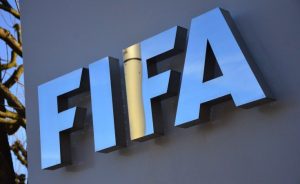It’s all about millions of dollars . . . as Nakamba’s Villa kickstart EPL return

IT’S something that hasn’t happened since 1947 and, amid a global pandemic, a wave of protests and tumbling statues, the English Premiership bandwagon returns at Villa Park tomorrow.
In an age of the Black Lives Matter movement, which have seen a number of landmark statutes being brought down, Marvelous Nakamba and his Villa players have been discussing plans how they will play their part before the game.
“We are all equal, #BackLivesMatter #BlackOutTuesday,’’ Nakamba tweeted earlier this month.
Unlike the last time they played at home, the raucous atmosphere usually associated with Villa Park, will not be heard as fans won’t be allowed to enter the stadium.
Three months after the campaign was brought to a halt, amid the coronavirus outbreak, the most watched top-flight football league in the world rolls into life again in Birmingham at 7pm Zimbabwean time.
It’s the first June match for the English top-flight league in 73 years when the championship race was temporarily halted amid concerns sporting activities were turning into a distraction for the British people.
Back then, the Government was determined to boost productivity in British factories as the country emerged from the destruction caused by World War II.
Then, just like now, Liverpool were on their way to being crowned champions.
Fittingly, Villa — a club firmly steeped in the history of English football given they are one of the 12 founding members of the Football League in 1888 — will get the ball rolling again tomorrow when the season restarts.
Villa defender, Gershom Cox, scored the first own goal, in the history of the English Football League, when he beat his own goalkeeper in the opening weekend of the programme on September 8, 1888.
Five years later, Villa became the first club in professional football history to pay more than £100 for a player when they acquired Scottish footballer, Willie Groves.
But, times have changed.
Villa were able to splash more than £120 million in new players, before the start of this season, with about £11 million going into the coffers of Belgian side Club Brugge for Zimbabwe international midfielder Nakamba.
However, the massive investment was meant to try and preserve the club’s status in the English Premiership, whose membership brings huge financial rewards.
And, Nakamba and his teammates find themselves in a desperate battle to try and save their top-flight league status.
Should Villa win their game in hand, tomorrow, they will move to 28 points, a point above Bournemouth, Watford and West Ham and just a point behind Brighton and Hove Albion.
Survival is important because, as has been seen elsewhere, relegation comes with huge costs, including salary cuts for the players, as clubs adjust their budgets given the Championship doesn’t come with the rich pickings found in the Premiership.
And, Villa should know.
After all, just two years ago, the club faced the grim prospects of slipping into liquidation when Chinese businessman Tony Xia could not inject funds needed to settle a £4.1million bill to the UK tax authorities.
Two billionaire businessmen, Egyptian tycoon Nassef Sawiris and Wes Edens, an American equity investor, teamed up in July 2018 and took over Villa, injecting tens of millions of pounds into the club in a rescue package.
“Our football club could not make a £4.1 million bill to HMRC, the UK tax authorities,” Villa chief executive, Christian Purslow, told BirminghamLive.
“That is the definition of bankruptcy, bankrupt. And if (Edens and Sawiris) hadn’t have put £60million in very quickly our club would have been liquidated.
“One of the great, founders of English football would have been gone. We’d have been Glasgow Rangers, we’d have been starting again. That, even in itself, was a wonderful act.”
And, a comprehensive study by The Athletic, using an analysis of all the Premiership club accounts filed at the Companies House over the last few months, highlights the scary picture for clubs like Villa should they lose their Premiership status.
“The league’s total income last season was £4.8 billion, with most clubs reporting rises, albeit mainly small ones, in all three revenue streams — broadcast, commercial and match-day,’’ The Athletic reported.
“Only Watford reduced their wage bill year-on-year. The league’s overall staff costs topped £3 billion. This means they spent 64 percent of their income on wages.
“But, that is the average. Bournemouth, Everton and Leicester all spent more than 80 percent of their turnover on staff.
“Exactly half the league spent more than 70 per cent of their income on wages, a level that automatically raises red flags for European football’s governing body UEFA.
“According to Deloitte’s Annual Review of Football Finance last May, the wage/turnover ratio was rising across Europe’s ‘Big Five Leagues — England, France, Germany, Italy and Spain — with the Premier League’s figure rising from 55 percent in 2016-17 to 59 percent 12 months later.
“The wage/turnover figures for three promoted teams, Aston Villa, Norwich City and Sheffield United, are even worse at 175 percent, 161 percent and 195 percent, respectively, but that is par for the course in the Championship, which is a disaster zone for those who like balanced books and tidy profits.’’
Villa recorded a £68.9 million loss in the 2018/2019 season while their opponents, tomorrow, ran £21.3 million losses.
For Sheffield United, the last club Peter Ndlovu played for during his stay in England, the wage/turnover ratio was 195 percent while for Villa it was 175 percent.
It’s the pressure of losing £1 billion, had the league not been completed, which forced the clubs to try and go the full distance.
“Travel costs, utility bills, repairs, insurance, paper clips… they all add up and pretty soon they started nibbling into the overdraft,’’
The Athletic reported.
“The only way the clubs further down the economic ladder can even hope to compete with the big-earners on the pitch is to spend a higher percentage of their income on salaries and ask their owners to keep topping up the shortfalls.
“These clubs also tend to be more reliant on the league’s main source of income — broadcast rights.’’
Edens told Bloomberg it was important for Villa to retain their Premiership status.
“The ambition is obviously to stay up, it’s a competitive league, that first step up is a big one,” he said.
“Villa has a very long and proud tradition, it’s been a very successful club.
“Our goal is to be one of the top clubs in the world, play in all the major competitions, do all those things.
“The first step is to stay up. We’ve got a tough run-in, but then so do a lot of other teams. We’ve got a lot of talent on the team, so we feel good about that.”



